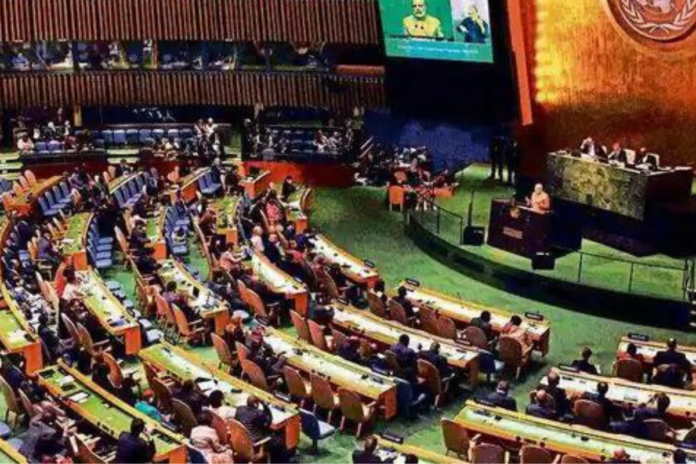In an important development, the United Nations General Assembly (UNGA) has backed a resolution to bestow additional “rights and privileges” on Palestine. They have called upon the Security Council to reassess their plea for complete United Nations membership. The assembly, which consists of 193 member states, gave their nod to the resolution proposed by Arab and Palestinian groups. This was done with a significant majority, with the vote tally standing at 143–9, and 25 members choosing to abstain.
As reported by AP news agency, the United States has once again voiced its disagreement with the assembly resolution, mirroring the position it held during Security Council debates. The US deputy ambassador, Robert Wood, highlighted on Thursday the Biden administration’s resistance, siding with Israel in their opposition to the resolution. Wood expressed, “From the onset, we’ve stated unequivocally that there is a procedure to gain complete membership in the United Nations.”
As per the UN Charter, potential members are required to be recognised as “peace-loving,” and their entry must be endorsed by the Security Council prior to final ratification by the General Assembly. In 2012, Palestine was granted the position of a non-member observer state within the UN.
“Fresh Drive for Palestinian Membership Amid Gaza Conflict”
The renewed interest in granting membership to Palestine aligns with the escalation of conflicts in Gaza, which has pushed the Israeli-Palestinian conflict into the international forefront. During the discussions, several concerns were raised and significant changes were made to the draft resolution to accommodate the concerns raised by countries like the United States, Russia, and China, as reported by AP.
The ultimate version leaves out terms suggesting equality with member nations and declares decisions relating to Palestinian rights and privileges as “extraordinary” without establishing a standard. Importantly, the annexed draft outlines a range of rights and privileges for Palestine, such as involvement in UN meetings and the freedom to express opinions on various topics, albeit without the ability to vote.
In 2011, the first attempt by Palestinian President Mahmoud Abbas to gain UN membership met with failure in the Security Council due to lack of adequate backing. Later on, the General Assembly improved Palestine’s standing to a non-member observer state, which eased its integration into global forums and institutions.
Even though the US exercised its veto power in the Security Council vote on April 18, leading to a disappointment, the Palestinians still managed to gain more support for their full membership in the UN. The voting results showed 12 nations siding with them, while the United Kingdom and Switzerland opted to abstain.


